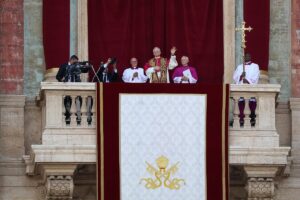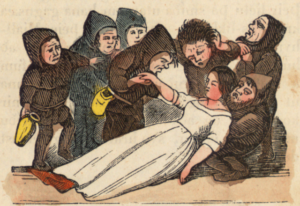
On New Ways of Thinking about the Church (Part I)
For a growing number of Christians, mainly in the Western hemisphere, church-talk has become problematic for many reasons. However, for theology to shy away from or even avoid questions of the church only further limits the credibility of theology. Throughout his œuvre, Roger Haight has consistently tackled challenging issues for contemporary publics. With an introduction by Andreas Telser

A New Pope, A New Dawn
Personal reflections on the papacy, an American pontiff, and hope that faith and leadership may yet shape our fractured world.
By Willemien Otten, Professor at the University of Chicago Divinity School. With an Introduction by Andreas Telser.

The Zero Theorem – “Zero must equal 100%”[1]. AI, Totalitarianism, and The Voluntary Path to Self-Enslavement: A Theological Perspective
The question of what philosophy and theology have to contribute to the development of AI has been a matter of scholarly debates. While AI entered common human lives almost abruptly and immediately, human adaptability proved impeccable: AI became a part of life as another commodity. In her contribution, Milja Radovic explores the possible downsides of AI from a theological point of view and asks the question: Is AI really for the benefit of humanity?

The Small Stone in the Shoe. When Obsession Meets Grace: The Ambiguities of Scrupulosity – A Review of „Can Scrupulosity Be Spiritually Innocent?“
In her article, Veronika Hübner reflects on a recent lecture by Tasia Scrutton at the European Academy of Religion, exploring the ambiguities of Scrupulosity—a religiously infused obsessive-compulsive condition that can deeply disrupt faith while occasionally fostering spiritual depth.

“Do you Hear the People Sing?”[1]. Cultural (Re)Interpretations and Reshaping Memory
In the world inter-wired through social media and AI, cultural reinterpretations and appropriations receive ever increasingly new meanings. Frequently cultural (re)interpretations and reshaping of historical memories form a dangerous mode for societal discourses. In this article Milja Radovic focusses on the Balkan Peninsula and considers it as one of the most important places in Europe where a dynamic processes through which communities reshape history, memory and culture takes place.

Between Apocalypse and New Life. The 78th Festival de Cannes: 13th – 24th May 2025
In this contribution, Milja Radovic reflects on the festival’s highlights, the role of the Ecumenical Jury and her own experience as a jury member. The articles explore some of the most interesting movies from the festival, offering thoughtful reviews and insights from the author’s perspective.

The Troubles with Snow White. Cinematic Cultural Shifts and Re-imagining the Fairytale
The importance and meanings of fairytales have been studied across a range of scholarly disciplines. According to the traditional understanding, the universal aspect of fairytales is in examining and presenting the human condition and life-lessons about the battle between good and evil and the importance of virtues in life. The question is: should contemporary, re-imagined fairytales reflect the spirit of their time, ideologies or politics? An essay by Milja Radovic

The Year of Living Dangerously – In the land of raspberries and students –
Amid deepening political crises and societal fragmentation, the student uprisings in Serbia signal a resurgence of community and political engagement, challenging both local and global forces. In this contribution, Milja Radovic explores the theological dimensions of this movement, emphasizing that „being is communion“ and that transformation occurs through faith in action and ascetic praxis. Christian thought, she argues, can offer an antidote to apathy and isolation, fostering a communal life.

St. Ignatius, the Spiritual Exercises and the social sin of racism
Roger Haight’s theology has always been in a critical dialogue with how contemporary Westerners experience reality, while giving his theology a liberationist bent. This might be the reason for his more recent interest in facing racism, one of the painful scars of US-American history. A scar that seems to be torn open again by the announced policies of the current administration.

A wicked perspective on Butler’s „Frames of War. When Is Life Grievable?“
The new contribution of Tristan Genoske engages with the movie Wicked, in particular with the often overlooked song „No one mourns the wicked“. Yet its message is among the strongest. Was a life that no one mourned ever lived? Are there mechanisms of power that prevent us from mourning the dead? Who is wicked in our society and are we grieving them? Starting with Judith Butler’s text „Frames of War. When Is Life Grievable?“, the contribution tries to answer to these questions examining what is happening in Oz.